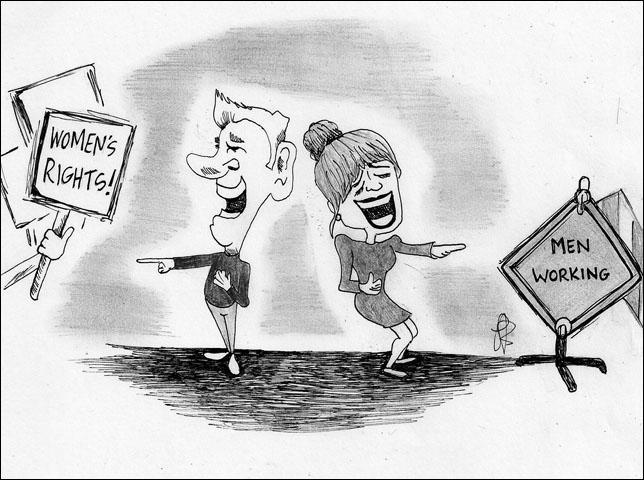Imagine for a moment you’re a woman. For some of you, this will be easier than for others.
From this point on, the government and religious institutions will claim to have broader control of your body, specifically your reproductive rights. As a man, as long as you don’t wave your penis at traffic, the government largely leaves us to our own devices.
The discrimination has been particularly bad in the South, where Mississippi recently tried to regulate birth control and outlaw abortion.
As a woman, you’ll make less money than a man for the same amount of work. In some cases, you’ll work more than a man for less pay.
In 2008, women earned 77 cents on the dollar compared to men, according to Time Magazine.
I was raised with the impression that every job had a price, and no matter who accomplished the task, the pay was the same.
I was wrong. There is a glaring inequality between men and women that needs to be addressed.
Women’s rights and equal-pay protests arose all over the country this past weekend, including in Baton Rouge. Women’s issues have been a hot-button topic during this year’s legislative sessions.
The Lilly Ledbetter Fair Pay Act originated out of an act of pay discrimination. Ledbetter, who worked at a Goodyear Tire plant in Alabama, learned she was making far less than other male employees.
She sued for discrimination, but the case was thrown out because she did not file suit within 180 days of Goodyear first paying her less than her male counterparts, according to The New York Times.
Throwing out this case due to a small technicality makes a travesty of the justice system. How was Ledbetter possibly to know the exact date when Goodyear began paying her less than the men?
It would take a magnificently intrusive employee to dig through payroll and compare salaries. Such an act could have cost her job.
It would take an even ruder employee to blatantly ask a fellow employee what they make. Salary and politics are shunned from polite conversation.
Ms. Ledbetter had no way of knowing, and thus no way of filing suit within the allotted time period.
The Ledbetter Act has enemies. Many Republicans in Congress would like to see it repealed. They believe it could be a burden on small business during these tough times.
OK, let’s take that accusation and dissect it.
A small business is defined as an independent company with fewer than 500 employees, according to the U.S. Small Business Administration.
When I think small business, fewer than 50 employees seems reasonable. Anything more than that, and you’ve got yourself a pretty big business.
I can understand where a business with fewer than 50 employees could suffer from a mandatory increase in payroll for half their employees, but I have a tough time believing a larger company would be unable to reallocate some funds and make it happen.
More money in the pockets of employees is good for the economy. Duh.
Let’s look at the ethical side of the issue.
Our country has come a long way since the days of “This is America, where all men are created equal as long as they are heterosexual males of European descent – except the Irish.”
But we haven’t come far enough. Equal-pay standards have been established in the case of race, but not gender. It seems to me reforms are necessary and imminent.
Women deserve to earn the same as men for the same work.
I don’t care if the Helen Keller of the third world works for your company – the job should pay the same for everyone.
Parker Cramer is a 21-year-old political science junior from Houston. Follow him on Twitter @TDR_pcramer.
____
Contact Parker Cramer at pcramer@lsureveille.com
Scum of the Girth: Women deserve equal pay for the same job
May 1, 2012





